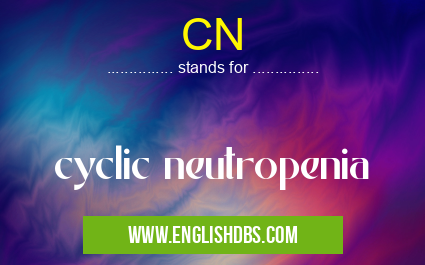What does CN mean in BRITISH MEDICINE
Cyclic neutropenia (CN) is an extremely rare haematological disorder that is characterized by regular episodes of abnormally low neutrophil levels in the blood, which can lead to recurrent infections. The condition is caused by a mutation in the ELA2 gene, which encodes a key enzyme involved in neutrophil production. The severity of CN depends on the degree of neutropenia and the frequency and duration of episodes, with periodic monitoring and prophylactic antibiotic treatment used to manage symptoms.

CN meaning in British Medicine in Medical
CN mostly used in an acronym British Medicine in Category Medical that means cyclic neutropenia
Shorthand: CN,
Full Form: cyclic neutropenia
For more information of "cyclic neutropenia", see the section below.
Definition
Cyclic neutropenia (CN) is an extremely rare hematological disorder that causes repeated episodes of low neutrophils—a type of white blood cell important for fighting infection—in the blood. This can occur every two or three weeks, and usually lasts for about one or two days. During these episodes, individuals with CN are at risk for infection due to their lack of protection against germs. In most cases, CN is caused by a mutation in a gene called ELA2; however, it may also be acquired as part of other conditions such as some types of leukemia.
Signs & Symptoms
Individuals with cyclic neutropenia experience recurrent episodes of low blood counts during which they are at risk for severe infections. Less common signs and symptoms include fever, mouth ulcers, fatigue and swelling around joints. Even when not experiencing an episode, individuals can have mild symptoms including fever, chest pain or shortness of breath.
Diagnosis & Treatment
The diagnosis of CN is made through laboratory tests including complete blood count (CBC), bone marrow aspiration or biopsy to confirm a decrease in mature circulating neutrophils over time. Once diagnosed, treatments depend on the severity and frequency of symptoms but may include antibiotics taken both daily and intermittently to prevent infections, as well as granulocyte colony-stimulating factors (G-CSFs). G-CSFs stimulate the production of neutrophils in order to prevent further complications from CN episodes.
Essential Questions and Answers on cyclic neutropenia in "MEDICAL»BRITMEDICAL"
What is cyclic neutropenia?
Cyclic neutropenia is an immune disorder characterized by recurrent episodes of low neutrophils, or a type of white blood cell. During the episodes, patients are at an increased risk for infection.
What are some of the symptoms associated with cyclic neutropenia?
Symptoms associated with cyclic neutropenia can include fever, fatigue, sore throat, mouth sores, skin infections and swollen lymph nodes. It’s important to note that these symptoms can be similar to other illnesses and should be evaluated by a physician.
What causes cyclic neutropenia?
Cyclic Neutropenia is caused by a mutation in the gene ELA2 which interferes with the production of white blood cells. This mutation is inherited and often appears as a genetic lontermap in families whose members have been diagnosed with this condition.
How is cyclic neutropenia Diagnosed?
A doctor may diagnose cyclic neutropenia through blood tests which measure the level of white blood cells over time. Additional tests may also determine if there is any underlying infection causing your symptoms.
Is there a treatment for this condition?
Yes, there are treatments available for those suffering from cyclic neutropenia including vaccinations and antibiotics that prevent infections along with medications such as G-CSF (granulocyte colony stimulating factor) which help increase the production of white blood cells during periods of low levels.
Final Words:
Cyclic Neutropenia is an incredibly rare hematological disorder that causes recurring bouts of low white blood cell counts which puts people at risk for severe infections. The condition is caused by a mutation on the ELA2 gene which encodes an important enzyme involved in producing certain kinds of white blood cells called neutrophils; however it can also be acquired through other related diseases such as leukemias. Although there is no cure for Cyclic Neutropenia yet available treatments include antibiotics and G-CSFs if necessary to help protect those affected from further complications posed by its episodes.
CN also stands for: |
|
| All stands for CN |
